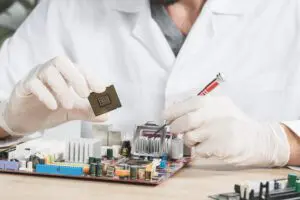PCB production delays can derail your entire project timeline and blow your budget. When your manufacturer promises a two-week turnaround but takes six, you’re left scrambling to explain the setback to stakeholders and clients.

(freepik/Freepik)
Finding a reliable PCB manufacturer starts with understanding what causes these costly delays. Whether you’re prototyping or scaling to mass production, knowing the common bottlenecks helps you avoid manufacturers who’ll put your project at risk.
Causes of PCB Production Delays
Any PCB project can face potential roadblocks. Here are the most common issues that can throw your timeline off track and how to prevent them.
Incomplete Design Documentation
Ever had a manufacturer come back with endless questions weeks into your project? It usually traces back to design documentation gaps. Whether it’s missing component specs or unclear assembly notes, these oversights can freeze production while teams wait for clarification. The worst part? These delays could have been prevented with a thorough design review upfront.
Parts Availability Problems
Nothing halts production faster than missing components. You might have the perfect design and a great manufacturer, but if key parts have 20-week lead times or worse, are suddenly obsolete, your project sits idle. This hits especially hard in medical and military projects, where you can’t simply swap in alternative components without extensive requalification.
Tooling Setup Challenges
Your manufacturer might need custom tools or fixtures to produce your boards efficiently. When they don’t plan for this upfront, you face delays while they design and fabricate these tools. This especially impacts boards with unusual shapes or special mounting requirements.
Production Line Transitions
Most PCBs need different assembly methods to handle various components. Each time your board moves between SMT manufacturing and through-hole assembly processes, it creates a pause point. Your boards sit waiting in queues, operators switch tasks, and what looked like a simple production schedule turns into weeks of unexpected delays.
Equipment Selection Problems
Manufacturing partners may not always select the best equipment for your specific board requirements. When they use generic production lines instead of specialized equipment, it often leads to quality problems and rework cycles. This becomes especially apparent in boards with fine-pitch components or special finishing requirements.
Prototype Testing Issues
The prototype phase is where early problems surface, but too many companies rush through it. A rushed prototype from a cut-rate manufacturer often leads to multiple revision cycles. Quick-turn prototype circuit board manufacturer services might cost more upfront but can slash your overall development time.
In-House vs. Outsourced Assembly
Many teams start with in-house assembly to save time and money. But complex boards quickly expose the limitations of this approach. A professional PCB assembly company with automated lines can place and solder more components in an hour than 50 hand-solder operators can manage in a day (and deliver better consistency with fewer errors).
Quality Requirements
Every product has quality standards to meet. Choosing a manufacturer without the right certifications for your industry means you’ll need extra testing and validation steps. These additional quality checks cascade into delays at every stage, adding weeks or months to your timeline.
Documentation Transfer Problems
Moving your design files to the manufacturer’s production system isn’t always smooth. Different software versions, incompatible design rules, or mismatched layer definitions can cause confusion. These technical misalignments often surface late in the process when changes become more expensive and time-consuming.
Communication Breakdowns
Production issues don’t wait for email responses. When your manufacturer is multiple time zones away, simple questions can take days to resolve. While USA-based electronics manufacturing partners might seem more expensive, the ability to get immediate answers and visit the facility can prevent weeks of accumulated delays.
Environmental Controls
PCB manufacturing requires strict temperature and humidity control. When manufacturers don’t maintain proper environmental conditions, you might face issues with solder joints, component placement, or board warping. These problems typically don’t show up until final testing, forcing you to restart production from scratch.
The True Impact of Manufacturing Delays
Manufacturing delays derail product launches and expansion plans. Your customers can’t integrate PCBs into their assemblies on time. Your sales team stops promising quick turnarounds. Your major clients start to question if their electronic products are safe with your supply chain.
Each PCB production delay affects your industry standing. When electronics manufacturers need reliable board suppliers, they share experiences. Nobody wants to risk their product deadlines on a partner who can’t deliver. In the electronics industry, your track record with PCB deliveries shapes every future opportunity.
Conclusion
Understanding these production bottlenecks is only the first step. To protect your project from costly delays:
- Partner with manufacturers who communicate proactively about potential issues rather than hiding problems until they become crises
- Build realistic buffers into your timeline for common delays like component sourcing and quality testing
- Request detailed production schedules that show every step from design review to final testing
- Get references from previous clients about how the manufacturer handles unexpected problems
Most importantly, remember that the lowest quote often leads to the highest project costs when delays and quality issues surface. Focus on finding manufacturers with proven track records of managing complex projects and meeting deadlines. The right partner will help you navigate these common bottlenecks while keeping your project on track.
Video

Infographic
PCB production delays can disrupt your project timeline and escalate costs. Whether prototyping or moving to mass production, knowing common bottlenecks can help you choose reliable manufacturers. Learn about issues that can derail your timeline in this infographic.

